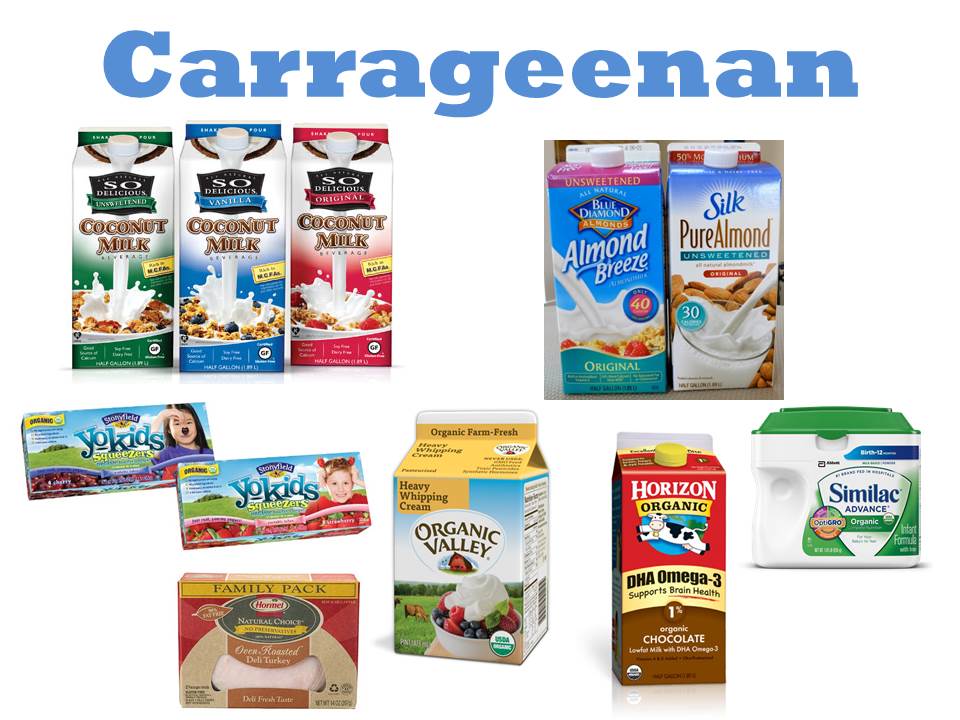Lots of foods can contain some pretty weird-sounding stuff. That’s because processed foods have some unnatural things they have to do. For example, a cookie might get made in Texas, trucked across the country in the middle of the summer, sit in a warehouse for a couple of weeks before it is sold and then ride home in the trunk of your car. And when you open the package, you expect the cookie to look perfect. Not an easy thing to accomplish, it turns out.
What exactly is Carrageenan?
“Carrageenans or carrageenins are a family of linear sulfated polysaccharides that are extracted from red edible seaweeds. They are widely used in the food industry, for their gelling, thickening, and stabilizing properties.” (Google)
It is important to note that Carrageenan is not digestible and has NO nutritional value. It is often used because it thickens and emulsifies products and it is often found even in organic and “natural” products. Carrageenan is even fund in organic items like: coconut milk, almond milk , yogurt, and sad to say even infant formula.
“Although derived from a natural source, carrageenan appears to be particularly destructive to the digestive system, triggering an immune response similar to that your body has when invaded by pathogens like Salmonella. The result: “Carrageenan predictably causes inflammation, which can lead to ulcerations and bleeding,” explains veteran carrageenan researcher Joanne Tobacman, MD, associate professor of clinical medicine at the University of Illinois School of Medicine at Chicago (one of the leading researchers in the field of digestive health) shed some light on carrageenan:
The food ingredient irritates by activating an immune response that dials up inflammation. Her previous work showed a concerning connection between carrageenan and gastrointestinal cancer in lab animals, and she’s involved with ongoing research funded through the National Institutes of Health that is investigating carrageenan’s effect on ulcerative colitis and other diseases like diabetes.
“Dr. Tobacman said that her research has shown that exposure to carrageenan causes inflammation and that when we consume processed foods containing it, we ingest enough to cause inflammation in our bodies. She explained that all forms of carrageenan are capable of causing inflammation. This is bad news. We know that chronic inflammation is a root cause of many serious diseases including heart disease, Alzheimer’s and Parkinson’s diseases, and cancer.
Dr. Tobacman also told the board that in the past, drug investigators actually used carrageenan to cause inflammation in tissues in order to test the anti-inflammatory properties of new drugs. And she reported further that when laboratory mice are exposed to low concentrations of carrageenan for 18 days, they develop “profound” glucose intolerance and impaired insulin action, both of which can lead to diabetes.”
More information can be found here on this interview.
One thing I know for sure, inflammation is a precursor to many forms of dis”ease”, so I work very hard to minimize any inflammation in my body; and you should in yours too!
Here is a great resource for you in regards to where carrageenan is hiding.
Please note that I am not a medical practitioner. The content of this website is provided for general informational purposes only and is not intended as, nor should it be considered a substitute for, professional medical advice. Do not use the information on this website for diagnosing or treating any medical or health condition. If you have or suspect you have a medical problem, promptly contact your professional healthcare provider. By using this website, you assume full responsibility and liability for your own actions.






Regarding the safety of carrageenan, there has been an amazing amount of misinformation being blogged about carrageenan being unsafe as a food ingredient. In spite of this misinformation, carrageenan continues as the safe food ingredient it has always been. If it were not, the principal regulatory agencies of the world (US FDA, FAO/WHO JECFA, EU EFSA, and Japan Ministry of Health) would not approve its use, and all of them give the necessary approvals. The only application restricted as a precautionary measure is stabilizing liquid infant formula and a definitive toxicology is about to be published that is expected to remove this restriction.
Why all the concern about the safety of using carrageenan in foods? Starting in the 1960s there have been research studies showing that if excessive doses of carrageenan are consumed in animal trials inflammation can be induced in the small intestine. Likewise, inappropriate methods of introducing the carrageenan into the animals, i.e. in the animals’ only source of drinking water, have induced an inflammatory response in the small intestine. However, there has never been a validated inflammatory response in humans over the seventy plus years carrageenan has been used in foods. The anecdotal “upset tummies” reported in blogs as coming from consuming a food containing carrageenan are hardly
reliable sources of information on the safety of carrageenan.
Inflammatory responses in animals only occur when carrageenan can cross the blood membrane barrier of the small intestine. This only occurs when the extreme feeding conditions mentioned above are employed. Normal feeding regimes induce no such response.
Over the last decade a group of molecular biologists at the University of Illinois at Chicago lead by Dr Joanne Tobacman have been exploring the in vitro interaction of carrageenan with various genes and conclude that carrageenan can cause inflammation in the gut via a binding mechanism involving TLR-4 receptors. This group also concluded that carrageenan degrades in the gut and the degraded carrageenan can permeate the membrane barrier. Recent studies refute both of these claims, and furthermore this recent research questions the validity using in vitro studies to mimic the in vivo events in the GI tract when a human consumes a food containing carrageenan.
The bottom line on the safety issue is that in spite of all the efforts to downgrade or question the safety of carrageenan, particularly by bloggers, carrageenan is a safe food ingredient in all of the major regulatory jurisdictions of the world.
With the things that we do know in regards to how gut flora imbalance causing a variety of health issues ranging from IBS to more severe hinges like ADD and autism…it is important to take note when research shows that something has been proven to cause inflammation. Especially since that is where the majority of our immune system lies. If we can remove things from our diet and feel better for it…then we should. I can also state just because the FDA says something is safe means absolutely nothing to me. Look at all the drugs they “approve” as safe then you see commercials about contact a lawyer if you have taken “xyz” and now suffer from “xyz or the death of a loved one”. Not enough for me or my family.
Here are two different PubMed articles talking about studies that have been done (there are quite a few more than just these 2)
http://www.ncbi.nlm.nih.gov/pubmed/11675262
And this one. http://www.ncbi.nlm.nih.gov/pubmed/22011715 It is worth pasting in the conclusion–
This is the first report of the impact of carrageenan on glucose tolerance and indicates that carrageenan impairs glucose tolerance, increases insulin resistance and inhibits insulin signalling in vivo in mouse liver and human HepG2 cells. These effects may result from carrageenan-induced inflammation. The results demonstrate extra-colonic manifestations of ingested carrageenan and suggest that carrageenan in the human diet may contribute to the development of diabetes.
I hope these help further your research on the topic.
Warmly,
Leslie/Lifeholistically